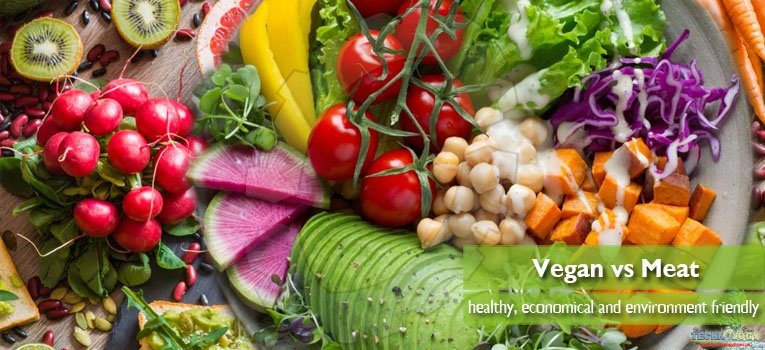About 87 published studies have reported that vegan diet is highly effective for weight loss. Even, it was observed that vegan diet reduced obesity without doing exercise

The key driver for eating is of course hunger but what we choose to eat is also important. The choice of our diet should be wise and with a sound background knowledge because our diet should improve our health. Based on choice of diet there are two types of diets taken in, one who strictly eats meat is a meat eater, while a strict vegetable eater is vegan. There is a great quest to know which diet is more beneficial, nutritious, economically and environmentally sustainable.
Nutrition value of Vegan
According to science there are so many studies conducted in support of plant-based diet being healthy and effective from nutritional point of view. Moreover, at least 87 published studies have reported that vegan diet is highly effective for weight loss. In one study, it was observed that vegan diet reduced obesity without doing exercise, because vegetables is an organic food and helps to burn more calories while meat is stored as fat in body. Low BMI (Body Mass Index), reduced weight and obesity are associated with vegetable diet.
The plant-based diet is a high-quality diet with more magnesium, potassium, iron, thiamine, riboflavin, folate and vitamins in it. Furthermore, as plant-based diet is low in fats, it helps prevent and treat diabetes by improving insulin sensitivity and decreasing insulin resistance, respectively. On the other hand, meat intake associates the risk of high blood pressure and heart diseases with itself.
Health risks associated with meat
Another health implication of eating processed and red meat is the risk of developing cancer. The risk of developing bowel cancer is 17% high, which could be due to high haemoglobin content in red meat. When meat is ingested, the haem is dissociated inside body, which contains N-nitroso compounds. These compounds damage cells lining the bowel. To repair the damage, rate of replication of DNA increases along with chances of errors, hence there is a higher risk of cancer.
Impact on environment
Vegan diet not only provides health and nutritional benefits, but it is also pro-environmental. According to Research Proceeding of the National Academy of Science, livestock chew up large share of world’s basic resources and are superior land users. Livestock uses 3rd of all freshwater and contributes 10 to 12% in greenhouse gas emission.
If comparison of different factors between raising livestock and producing plant-based diet is drawn, then plant-based diet is highly preferable. On average the land requirement for 10g of vegetable is equal to 1g of animal protein, water requirement for meat is 26 times more for meat, and moreover fossil fuels efficiency for vegetables is 2.5 to 5.0 factors better than animal husbandry. In addition to this, phosphate rock input is 7 times high in meat production. The input of resources for meat is higher while the emission of acidifying compounds such as sulphur, NO, NH3 is 7 times greater from meat production resulting in pH changes.
The biocides (disinfectants) usage in meat production is 6 times high, which also affects non-target species in ecosystem and human health as well, says American Journal of Clinical Nutrition.
The adverse effect of meat and livestock on environment is overgrazing. All the livestock depends on grass for their growth and nutrition and due to overgrazing most of the grassland is ruined. Moreover, the accidental non-point discharge of manure in aquatic ecosystem leads to eutrophication and water pollution. This results in water contamination and loss of biodiversity as aquatic ecology gets upset.
Biotechnology to craft animal free dairy products
It is objected by meat eaters that vegetable diet lacks an essential vitamin B12 (cobalamin), inculcating nutritional deficiency in vegans. With the advent of plant biotechnology, this problem is resolved. The plants are genetically modified so that they have higher nutritional content and vitamin B12 in it. Moreover, calcium is added to soymilk through plant biotechnology.
Furthermore, there is production of milk from plants by a company Perfect day food, to support veganism and animal rights. This milk is more nutritious, lactose free, safe, and sustainable, with high protein content, hormone, antibiotic and steroid free, also earth friendly and with a longer shelf life. The dairy yeast and sugar initiate the synthesis of plant cloned milk and is fermented. The nutrients, plant fats, plant sugars and milk proteins are added resulting in milk being produced. This milk production consumes 65% less energy, 84% less greenhouse gas emission, 91% less land usage, and 98% less water consumption.
This suggests that we can remain healthy with all the nutritional fulfilment while saving our environment and resources by being a vegetarian. As meat poses greater health risks and less environmental sustainability.
This article is jointly written by Amna Komal Khan and Mahnoor Masood. They are MPhil research scholar at Department of Biotechnology, Kinnaird College for Women, Lahore.